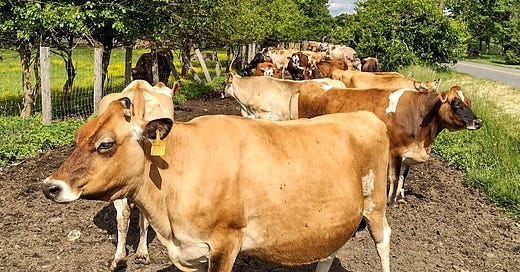In a recent podcast, I interviewed lifelong dairy farmer Bobby Prigel. We discussed some of the terminology that the media tosses around regarding milk and dairy products.
It’s can be confusing if you’re not used to it.
This article is meant to clarify what some terms mean so you can be a more informed buyer.
I think the confusion with all the terms is intentional. It makes it harder for you, as a potential customer, to know what you’re getting. Or, for that matter, what you want.
Of course, this is not an exhaustive list of dairy terms. If something in this list piques your curiosity, or you've seen it referenced differently somewhere else, additional reading is your friend.
But for now, here’s a stab at some of the terminology":
1. Raw milk
Raw milk is milk that has not been pasteurized or heat treated. That’s it. This can be cow, goat, sheep, camel and/or water buffalo milk.
For most of the media and the conventional dairy industry, raw milk refers to the milk from the farms’ big bulk tanks that gets picked up by the milk truck, shipped to the processing plant, and then processed into the various dairy products that you are used to seeing at the store.
For people who are advocates of raw milk, this is usually a little more nuanced and can include the assumption that the milk is grassfed, properly tested for safety, and that the cows are treated well. These are not always proper assumptions. Raw milk literally just means not pasteurized.
No need to assume anything. If you’re interested in raw milk, make sure it’s a farm you can ask questions such as how often they test and for what. And, your best bet is to visit the farm and check out their processes for yourself.
2. Ultra pasteurized, or Ultra high temp (UTH) milk
This involves heating the milk up to 280 degrees for a few seconds and then rapidly cooling it. Some people cannot tolerate this kind of milk at all. It’s shelf stable for months, and, it can’t be used for making cheese. Many people experience upset stomach or other milk to severe digestive issues after consuming ultra-pasteurized milk.
3. Homogenization/homogenized milk
This is the process that evenly distributes the fat molecules in the milk through a high pressure situation. Some say this process makes the far molecules unnatural and our bodies don’t recognize them as dairy fat. Homogenization also creates uniformity of fat content in all the processed milk. (4%, 2%, skim, etc)
4. "Grassfed" dairy
“Grassfed” dairy is much harder to define. When some people ask about grassfed milk, they are asking about the cows being exclusively grassfed. But when some farmers answer this question, they are answering whether or not the cows get ANY grass or hay. If you want to be on the same page as the person you’re asking or answering, ask more specific questions.
5. A2/A2 milk
A2 is a branding term with a legal definition. A2/A2 refers to a specific gene in cows. (I’ve written about the marketing aspect of A2 milk extensively.) About 5,000 years ago, some cows had a genetic mutation and started producing the A1 protein. Some people speculate—and get very passionate about it—that the A1 gene mutation causes a serious reaction in some humans and causes milk digestibility issues.
The only way to know for certain if the cows are A2 genetics is to test each individual cow that produces milk. Because it’s a mutation, even a cow with two A2/A2 parents can have the A1 protein. If this is important to you, ask for the test results. It’s also not breed specific. Holsteins can be A2/A2 and Jerseys can be A1. Some farmers will test their bull and a few cows and then make claims as to their herd being A2 without getting the individual tests done. Be aware and ask the right questions. Goats, sheep, camel and water buffalo are all naturally A2/A2.
6. Conventional milk
This is kind of a catch-all phrase that means different things to different people. Sometimes it means the farm is “conventional” (and this can vary a lot in meaning), and sometimes it means the milk is pasteurized. And other times it means something else to the person saying it. What does it mean to you? To understand what you’re getting, be clear and specific in your questions and clarify what you mean by asking follow up questions.
7. Organic dairy
Organic is a clearly defined term and enforced by the USDA. If a farm isn’t certified organic, they can (and do!) get in trouble for using the term. That being said, many farmers with organic practices are disgusted by everything allowed under the organic certification and work hard to go above and beyond the standards for organic. But on the flip side, some farms will claim to be organic when they are far from it!
Organic always refers to methods and standards for production (like what kind of feed the cows get and how the can be treated for illness) and this is a totally separate category than raw.
Remember, specific questions are your best bet to understand what a farmer means when they say they are organic or beyond organic.
Take a listen to the interview and learn a little more about the dairy industry.
And be sure to ask the right questions so you get what you’re expecting if you’re looking for raw milk.
Are there any other terms you’ve heard that you’re curious about? Drop a comment and let me know.






Thanks for the point about asking questions, in particular! Assume makes an ass out of u and me, as the saying goes!
Super thorough explanation. I think it’d also be helpful to explain grass finished. We have a beef share and specifically sought a grass finished beef farm, which was difficult to find! But many people are unfamiliar with this term.